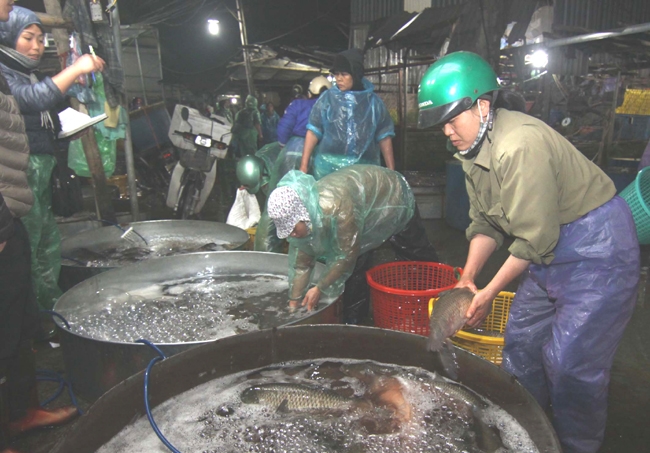 Economy
Economy

A deputy chief of the HCM City Food Safety and Hygiene Division has called for setting up an independent food safety agency under the city administration with authority to investigate and heavily penalise violators.
 |
| Officials say HCM City’s wholesale markets need storage facilities where they can store unhygienic foods that have been sent for testing. VNA/VNS Photo Vũ Sinh |
HCM CITY (VNS) — A deputy chief of the HCM City Food Safety and Hygiene Division has called for setting up an independent food safety agency under the city administration with authority to investigate and heavily penalise violators.
Nguyễn Thị Huỳnh Mai, speaking on the sidelines of a forum titled “consumers and their health fears” in HCM City yesterday (March 31), told the media that food safety and hygiene is currently managed by three different departments -- health, agriculture and rural development, and industry and trade.
“There are shortcomings in the co-ordination between the three.”
Each agency has its own regulations, and they often overlap, but not the authority to punish offenders, she said.
“An independent agency will resolve these shortcomings. It is very important to have the authority to punish violators.”
The experience of countries like the US, Korea and Thailand should be studied to set up the independent agency, which in these countries manages the issue effectively, she said.
Mai called for setting up laboratories with modern equipment in the city for quick testing of food.
She also said the city’s wholesale markets need storage facilities to keep unhygienic foods that have been sent for testing
Under existing regulations, authorities cannot seize foods until tests are complete, but by the time the results are available the dubious products are already sold, she explained.
“It is very difficult to seize foods.”
Authorities are also unable to regulate food sold at illegal markets to workers at industrial and export processing zones, she said.
Mai said the city saw the number of cases of food poisoning decrease from eight in 2011 to six last year, and the number of people affected from 850 to 268.
Nguyễn Hoàng Dũng, director of research and development at the city Institute for Economics and Management, said though relevant agencies have set up hotlines to receive public complaints, such complaints are not acted on.
This causes people to lose trust, and they would stop complaining about problems related to food safety and hygiene including fake products, he warned.
“The Government should treat [food-safety] violations as a crime because they can destroy health. Severe punishment should be imposed.”
A representative of the city Consumer Association said though a law on protecting consumers’ rights has been enacted, there is no dedicated agency to enforce it.
Nguyễn Thành Danh, deputy head of the Bình Dương Province Market Management Department, said violators are mostly small producers like household-based establishments.
They do not know that the additives they put in food are banned, and they just continue with their parents’ practices, he said.
Educating them is very important, he added. — VNS




